- Home
- Thomas Cahill
Mysteries of the Middle Ages Page 7
Mysteries of the Middle Ages Read online
Page 7
By such encouragement were the customs of the northern barbarians allowed to enter the European mainstream. The masks and ghosts of Hallowe’en, the vernal and venereal tomfooleries of May Day, as well as the lustral bathings and lantern-hung forests of Midsummer Night, taken from the Celts; the toasted cheese, toasts of warm ale, and rich desserts of northern winters and the ritual of sweetening with pine branches the claustral air in houses sealed against the cold, taken from the Germanic tribes; the word Easter, originally the goddess of spring accompanied by her fertility symbols of rabbits and decorated eggs, taken from the Saxons; the word Yule and the burning Yule log, taken from the Vikings—these and a thousand other customs of the savage heathens (which men like Clement of Alexandria would only have looked down their noses at) rolled into the former empire and were christened and absorbed. For this we have Gregory and many of his now nameless brother bishops to thank. Of course, they were not especially attracted to these outlandish customs, but they were too sensible to attempt to remake human beings from the ground up. They knew we all need our Christmas cookies or mug of grog or whatever we learned from childhood to associate with happiness if we are to be contented human beings.
In that time and place, zealotry was no longer in fashion among Christians. But there were certainly zealots among the barbarians. They burned things down, used books as kindling, left chaos in their wake. Christians, led by their clergy, saw their task as preservation of whatever remained intact, renovation of whatever could be salvaged, transformation of even barbarian things so long as these were not explicitly diabolical and contained even a smidgen of goodness.
All things considered, Gregory was the greatest and most humane pope in history (at least till the appearance of John XXIII in 1958). But his openness to the barbarians is characteristic of the openness of the entire Western episcopate in this period, which went a long way toward the weaving of a variegated European tapestry of characteristic personalities, specialized localities, and delightfully idiosyncratic customs and even products. (Where would we be today without French wines and cheeses, Belgian fried potatoes, Neapolitan pizza, Irish whiskey, German sausage, Hungarian goulash, and Czech beer?)
The times were against these bishops. Depredations or disease might overwhelm them at any moment. Gregory, like many other readers of the Book of Revelation, believed most sincerely that the world was nearing its final conflagration. They had neither time nor mind to waste on subtle points of doctrine or church order. They hoped only to keep themselves and others afloat as long as God allowed.
Meanwhile, in the Greek East, the barbarians remained an unreal threat. In “Waiting for the Barbarians,” a droll poem in modern Greek, Constantine Cavafy presents us with the daydream of a Byzantine of this period, who imagines with mounting excitement that the barbarians will descend upon his city and save it from boredom. But nothing happens, and the Byzantines are left in their changeless immobility and cultural stasis:
So now what will become of us, without barbarians?
Those men were one sort of resolution.
Well, there was plenty of exciting upheaval and catastrophic resolution in Western lands, more than anyone among the surviving Old Romans like Gregory ever wished to experience. In the East, there was consternation that the Western lands of the great Roman Empire were slipping away, sometimes it seemed with the connivance of Western bishops! In the East, not a peep was heard in objection to the absolute lordship of the emperor. In the West, however, bishops, left to fend for themselves, usually came to terms with barbarian chieftains, offered them titles and even clerical help (since the chieftains, who could neither read nor write, were incapable of long-distance communication and diplomacy). Eventually, the bishops found themselves assisting their chieftains’ hegemony. What else were they to do? In this new world, nominally the emperor’s realm, little principalities were growing into what would become in time medieval kingdoms. Why should the helpless emperor continue to be acknowledged overlord of these startlingly novel, but unopposable, political entities?
A new political theory came gradually into being. There are two swords, the sword temporal and the sword spiritual, the first wielded by the emperor and, in their fashion, by local monarchs, the second wielded by the church, its power vested especially in the pope and (one must add under one’s breath) his brother bishops. In the end, the temporal sword must yield to the spiritual. For the East, it was a shocking development. It would trigger in time the pope’s claim to be master of Christendom and king of kings. More shocking, however, than such a claim was a presumption almost hidden within it: one could challenge the Thirteenth Apostle, the emperor, the king, the state supreme, in the name of a higher good. “You have no business issuing dogmatic constitutions,” Gregory the Great’s successor Gregory II scolded the emperor in the early eighth century. “When it comes to dogmas, you haven’t the brains; yours are too crude and militaristic.”
This train of thought will lead at last to the concept of the separation of church and state and to practical challenges against law and against lawfully constituted authority by figures as diverse as the reformers of the fifteenth century, the Protestants of the sixteenth and seventeenth centuries, the philosophes and other Enlightenment thinkers and revolutionaries of the eighteenth century, the abolitionists of the nineteenth century, and the civil rights leaders of the twentieth century. In his “Letter from Birmingham Jail,” Martin Luther King Jr. addressed the “fellow clergymen” who had criticized him for breaking the law:
I would agree with St. Augustine that “an unjust law is no law at all.” Now, what is the difference between the two? How does one determine whether a law is just or unjust? A just law is a man-made code that squares with the moral law or the law of God. An unjust law is a code that is out of harmony with the moral law. To put it in the terms of St. Thomas Aquinas: An unjust law is a human law that is not rooted in eternal law and natural law. Any law that uplifts human personality is just. Any law that degrades human personality is unjust.
In this way, a man of the twentieth century, fighting against an evil unknown to (or at least unrecognized by) people of the distant past, joined hands across a millennium and more with Augustine of Hippo and Thomas Aquinas, the most profound and lucid thinkers of the Middle Ages.
The episcopal and papal claim to a separate realm—against the emperor’s claim to absolute authority—and the subsequent papal claim to absolute authority over absolute authority will grow more shrill as century follows century, eventually undermining all absolute authority (and much relative authority), as we shall discover by book’s end. Leaders and rulers, whether classical, medieval, or modern, can be good or bad, their leadership and authority humane or destructive, uplifting or degrading. Only their followers and subjects—we, the laymen and laywomen, the foot soldiers and amateurs, the dissenters and protesters, the free and imprisoned, the tortured and condemned, the anathematized and damned—can finally judge.
DATING THE MIDDLE AGES
THE PERIODS GIVEN HERE REFER PRINCIPALLY TO EUROPE. THEY ARE ELASTIC,
AND MANY SCHOLARS CALCULATE THEM SOMEWHAT DIFFERENTLY. THE
SUBJECT OF THIS BOOK IS THE HIGH MIDDLE AGES.
THE EARLY MIDDLE AGES [ALSO CALLED THE ĐARK AGES]
FOURTH THROUGH ELEVENTH CENTURIES:
FROM THE ACCESSION OF THE ROMAN EMPEROR CONSTANTINE IN A.D. 312 TO THE GRADUAL INCREASE THROUGHOUT EUROPE OF SCHOLARSHIP, COMMERCE, AND THE SIZE OF CITIES TOWARD THE END OF THE ELEVENTH CENTURY
THE HIGH MIDDLE AGES
TWELFTH AND THIRTEENTH CENTURIES; FIRST HALF OF FOURTEENTH CENTURY:
FROM THE BEGINNINGS OF THE TWELFTH-CENTURY RENAISSANCE TO THE COMING OF THE BLACK DEATH IN 1347
THE LATE MIDDLE AGES
SECOND HALF OF FOURTEENTH CENTURY; FIFTEENTH CENTURY:
FROM THE BLACK DEATH TO COLUMBUS’S FIRST VOYAGE IN 1492
As early as the ninth century, a maxim was making the rounds among Western Europeans, who now spoke a simplifie
d Latin that was already on its way to forking out into the modern Romance languages. It was a maxim that slyly subverted the worst excesses of duly (and unduly) constituted authority. We can trace it to a letter of advice that the English monk Alcuin sent his Frankish master Charlemagne, who had been awarded the newly minted title Roman Emperor of the West and crowned as such in Rome on Christmas Day 800 by Pope Leo III. Even though it is a maxim unthinkable in classical Greek, it owns deep roots in earliest Christian history: in the primitive church’s universal practice of submitting all candidates for bishop (as well as lesser ministers) to popular election, since it was then assumed that this was the best way to assure that the winner was also Heaven’s candidate. “Vox populi, vox Dei,” Alcuin reminded Charlemagne. “The voice of the people is the voice of God.”
RELEVANT ROMANS
MARCUS TULLIUS CICERO,
ORATOR AND CONSUL OF THE REPUBLIC 106–43 B.C.
CAESAR AUGUSTUS, FIRST EMPEROR,
WIELDING ABSOLUTE POWER FROM 30 B.C. 63 B.C.–A.D. 14
CONSTANTINE I, FIRST CHRISTIAN EMPEROR,
FOUNDER OF CONSTANTINOPLE A.D. 285–337
LEO THE GREAT,
POPE WHO DISSUADED ATTILA THE HUN FROM INVADING ROME D. 461
GREGORY THE GREAT,
POPE WHO WELCOMED THE BARBARIANS INTO CHRISTIANITY D. 604
AUGUSTINE,
ROMAN MONK, MISSIONARY TO THE ENGLISH,
FIRST BISHOP OF CANTERBURY D. C. 605
GREGORY II,
POPE WHO REBUKED THE EMPEROR FOR INTERFERING
IN RELIGIOUS MATTERS D. 731
LEO III,
POPE WHO CROWNED THE FRANKISH KING CHARLEMAGNE
AS ROMAN EMPEROR D. 816
a Alexander the Great had created what was called “the Greek East,” comprising greater Greece (Greece as it is today with the additions of the southern Balkans and the European territory now occupied by Turkey), Greek Asia (from the east coasts of the Adriatic and the Mediterranean to the Indus), and Greek Africa (Egypt and some noncontiguous territories that lay along Africa’s Mediterranean coast west of Egypt but that did not include the lands of ancient Carthage, where Latin came to be spoken). What became “the Latin West” began as Latium (modern Lazio), the territory surrounding the city of Rome, and came to comprise most of the Italian peninsula, Istria (modern Italy’s extreme east and most of Croatia), Illyria (the rest of the former Yugoslavia), Gaul (modern France), the Iberian Peninsula, north Africa, and eventually parts of Germany, Switzerland, the Low Countries, and southern Britain—that is, the Roman Empire at its farthest extent. By 1054, the year of the final division between Greeks (who were now Orthodox) and Latins (who were now Catholic), the Latin West had grown to include all of Europe except Greece and the Orthodox Slavic countries.
b Caesar Augustus, originally named Octavian, was adopted as son by his uncle Julius Caesar prior to the older man’s assassination. Rome’s first dictator-for-life, Julius Caesar was well on his way to becoming emperor but was never in fact awarded the title. Octavian upon his adoption assumed his uncle’s name, Caesar. The Senate, in awarding this second Caesar the new (and supposedly temporary) title imperator, also bestowed on him the honorific augustus.
c I have more personal experience of this request than I would wish. A dear friend, Dominique Jerome Green, was executed by the state of Texas on October 26, 2004. By the time of his death, after years of solitary confinement in a tiny cubicle on death row, Dominique was probably as much a saint as a human being can hope to be, a man of deep humanity and expansive forgiveness. It is unlikely that he was guilty of the crime he was convicted of, murder in the course of an armed robbery with three other (then) teenagers. He was surely guilty, however, of being poor and black. The one white participant in the robbery was never charged with any crime; and as we all know, there are no millionaires on death row, nor will there ever be. In death Dominique has been awarded the dignity he was denied in life: at his request, his mortal remains have been interred not in Huntsville’s brutal burial ground but in the shadow of the beautiful basilica of Santa Maria in Trastevere, the very spot where Christianity first took root in the imperial city of Rome.
d The pope, to begin with, was not in any sense head of the church. He was just bishop of Rome, one of several dioceses thought to have been founded by apostles and therefore especially ancient and venerable. The head of the church was Christ, as the New Testament pellucidly states. If the church could be said to have an earthly head, it was Constantine, who styled himself “the Thirteenth Apostle” and whose express confirmation the popes needed for their elections to be considered valid. The popes addressed the emperor with the same obsequious formality as everyone else; and the very appellation “pope” (or “papa”) was not reserved to them but was used widely in addressing bishops and even priests. Though this account—for simplicity’s sake—employs the word pope only for the bishop of Rome, the reader should bear in mind that such exclusive usage is anachronistic.
e For more on the gradual schism that divided East from West and for the role of the papacy in that process, see my Pope John XXIII, which contains a useful overview of papal history that cannot be repeated here.
f Constantine’s intervention in church affairs was hardly an unalloyed good. But I find myself at odds with purists who regularly insist that he ruined Christianity by making it part of the power structure. There was no way that this increasingly powerful movement could have remained on the cultural sidelines. But following imperial approval, Christianity’s besetting temptation, to which it has repeatedly succumbed, has been to use its political power for evil ends, even as it has justified its actions by the need to protect the church as an institution. We should not for this reason wish to deprive Christianity of its power as (at times) a uniquely positive social force, which has been employed to lasting effect at significant historical moments—as in our time, for instance, by such “establishment” Christian figures as Dr. Martin Luther King Jr., Archbishop Oscar Romero, Dom Helder Camera, Mother Teresa, and Archbishop Desmond Tutu—in behalf of the powerless on four different continents.
The depiction of Christianity in the popular thriller The Da Vinci Code as a fraud perpetrated by Constantine not only is preposterous to any reader with a modicum of historical knowledge but rests on melodramatically anti-Christian assumptions. The book’s further premise that the Catholic Church sends out Opus Dei hit men to murder anyone who has stumbled on the truth is a straightforward anti-Catholic libel. And its notion that Jesus fathered progeny by Mary Magdalene is a fantasy lacking the least historical support.
g For a far more complete treatment of the impact of Jesus on Western civilization, see the third volume in this series, Desire of the Everlasting Hills: The World Before and After Jesus. Readers of the series will note how much the original identity of Jesus as the Christ (or Messiah)—an identity proclaimed by the first Christians and necessitated by a Jewish conceptual framework—has given way to the identification of Jesus as Word/Son of God—an identification necessitated by a Greco-Roman conceptual framework. By the time of Constantine, Jesus was already shedding his Jewishness; and the Greek word Christos (Christ), meaning “Anointed One,” a translation of the Hebrew mashiach (messiah), had become in effect Jesus’s surname. It is unlikely that many Christians gave much thought to the meaning of this title or to the origin of Christianity as a form of Judaism.
h In the original Latin, the phrase I have translated “made man” is factus homo, which bears no hint of sexism, since Latin has a separate word for “man” in the sense of “male,” vir. Homo designates a human being.
i Earth tones were not popular in the Middle Ages. People preferred primary colors and failed to see the point even of diamonds, inevitably choosing (if they could) large carbuncular gems of intense color. Tastefulness had yet to make its début.
j You will find my presentation of Augustine’s life and thought, as well as my quarrel with him, in Chapter II of How the Irish Saved Civil
ization. Here I wish only to touch lightly on one positive aspect of his immense, if ambiguous, contribution.
k The end of the classical world under the impact of the barbarian “invasions” is the story with which How the Irish Saved Civilization, Volume I in this series, begins.
l Gregory’s enormous output of letters remains with us, one of the many priceless treasures of the papal (now Vatican) library, which Gregory founded. In an age of constant crisis, the number of his accomplishments is astonishing. It is his name, for instance, that is attached to “Gregorian” chant, for he managed in his spare time to collect and document the musical traditions of the Roman church. He died of exhaustion on March 12, 604, still in his early sixties.
ONE
Bingen and Chartres, Gardens Enclosed
The Cult of the Virgin and Its Consequences
I have freed my soul.
—BERNARD OF CLAIRVAUX

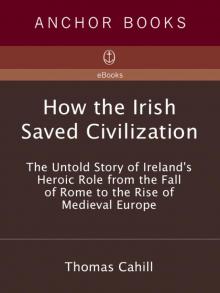 How the Irish Saved Civilization
How the Irish Saved Civilization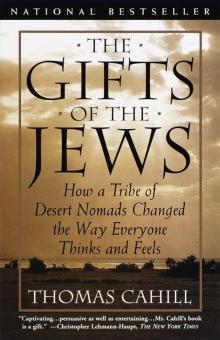 The Gifts of the Jews
The Gifts of the Jews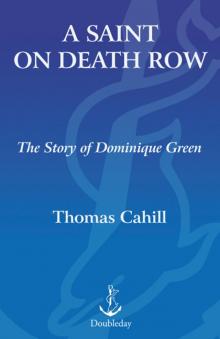 A Saint on Death Row
A Saint on Death Row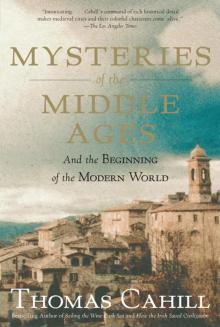 Mysteries of the Middle Ages
Mysteries of the Middle Ages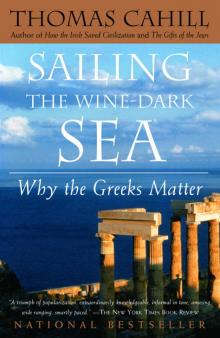 Sailing the Wine-Dark Sea
Sailing the Wine-Dark Sea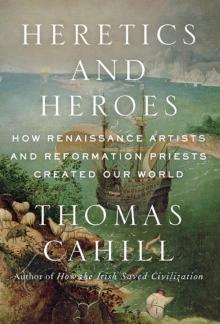 Heretics and Heroes
Heretics and Heroes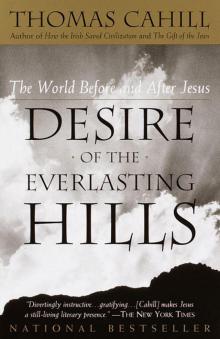 Desire of the Everlasting Hills
Desire of the Everlasting Hills